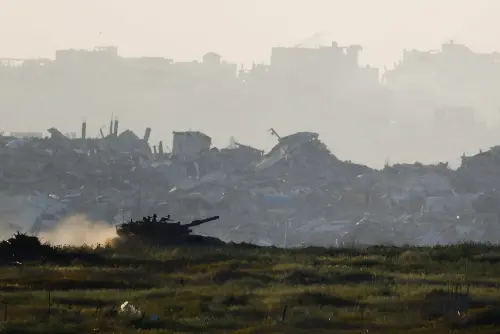The Israeli military announced the resumption of ground operations in central and southern Gaza, coinciding with airstrikes that reportedly killed at least 48 Palestinians, according to local health workers. This escalation follows a day in which more than 400 Palestinians lost their lives in airstrikes, marking one of the deadliest phases of the conflict since it escalated in October 2023 and effectively ending a ceasefire that had mostly held since January.
The Israeli military stated that these operations aimed to extend control over the Netzarim Corridor, which divides Gaza, and were described as a "focused" maneuver intended to create a partial buffer zone between Gaza's northern and southern regions.
In response, Hamas condemned the ground operation and intrusion into the Netzarim Corridor as a "new and dangerous violation" of the two-month-old ceasefire agreement. The group reaffirmed its commitment to the ceasefire and urged mediators to "assume their responsibilities."
The United Nations reported that a strike resulted in the death of a foreign staff member and injuries to five workers at a U.N. site in central Gaza City on Wednesday. Although Gaza's health ministry attributed the strike to Israel, the Israeli military denied responsibility, claiming it targeted a Hamas site where preparations for attacks on Israel were detected.
Jorge Moreira da Silva, executive director of the U.N. Office for Project Services, noted that Israel was aware of the U.N. compound, where individuals were living and working. U.N. Secretary-General Antonio Guterres called for a full investigation and condemned all attacks on U.N. personnel, stating that the incident brought the death toll of U.N. colleagues in Gaza since October 7, 2023, to at least 280.
The Bulgarian foreign ministry confirmed that a Bulgarian working for the U.N. died in Gaza, citing preliminary information. Israel's ambassador to Sofia expressed condolences and indicated that an investigation was underway, although an initial examination found no connection to Israeli military actions.
As Israel aims to eradicate Hamas, officials described the recent military operations as "just the beginning." The U.S. State Department placed the blame for the renewed hostilities on Hamas, indicating that a "bridge" proposal was still available to extend the ceasefire and facilitate the release of hostages held by the group in Gaza. A spokesperson emphasized that the opportunity was closing quickly, condemning Hamas' actions as "totally unacceptable" and reaffirming U.S. support for Israel.
Recent violence included an Israeli airstrike in Beit Hanoun, killing four and injuring ten, while another strike in Beit Lahiya resulted in the deaths of 24 people at a mourning tent, as reported by medics. Both Israel and Hamas have accused each other of violating the ceasefire, which had provided relief to Gaza's 2.3 million residents amidst devastation and repeated evacuations.
According to Palestinian health authorities, more than 49,000 people have died as a result of the Israeli campaign, which has caused a severe humanitarian crisis marked by shortages of food, fuel, and water. Israel has accused Hamas of using civilians as human shields, a claim the group denies while accusing Israel of indiscriminate bombings.
The conflict, ignited by a Hamas-led attack on southern Israel on October 7, 2023, has led to substantial casualties, including around 1,200 deaths and approximately 250 hostages taken, according to Israeli figures. Prime Minister Benjamin Netanyahu's decision to resume bombardments has sparked protests within Israel amid the ongoing hostage situation, where 59 individuals remain captive, with 24 believed to be alive.
Palestinian medics reported that Israeli tank shelling along the main Salahuddin Road resulted in one Palestinian death and additional injuries; local reports indicated that the military operations deterred civilians from using the road. Hamas spokesperson Abdel-Latif Al-Qanoua described the closure of Salahuddin Road as a "total coup" against the ceasefire agreement and a tightening of the Gaza blockade, expressing the group's willingness to consider any proposal that would initiate negotiations for the next phase and conclude the war.
Earlier on Wednesday, the Israeli army dropped leaflets in northern and southern Gaza, ordering residents to evacuate their homes once more. Defence Minister Israel Katz warned in a video statement that if the hostages were not released, "Israel will act with force you have not yet seen."
The renewed violence faced condemnation from several Western countries, including France and Germany, as well as from Qatar and Egypt, which have been involved as mediators in ceasefire talks. Jordan's King Abdullah called for a return to the ceasefire and the resumption of aid flows, labeling Israel's renewed attacks on Gaza as an extremely dangerous move during a visit to Paris for discussions with French President Emmanuel Macron.
